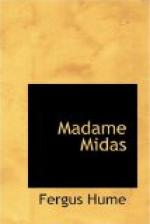‘Do you know who that is?’ he asked, in an excited manner, pulling his companion to the window.
Villiers looked through the dusty panes, and saw the young Frenchman walking away, as handsome and gallant a man as he had ever seen, followed by the slouching figure of his friend.
‘Vandeloup,’ he said, turning to Slivers, who was trembling with excitement.
‘No, you fool,’ retorted the other, triumphantly. That is “Mr Right".’
CHAPTER III
MADAME MIDAS AT HOME
Madame Midas was standing on the verandah of her cottage, staring far away into the distance, where she could see the tall chimney and huge mound of white earth which marked the whereabouts of the Pactolus claim. She was a tall voluptuous-looking woman of what is called a Junoesque type—decidedly plump, with firm white hands and well-formed feet. Her face was of a whitish tint, more like marble than flesh, and appeared as if modelled from the antique—with the straight Greek nose, high and smooth forehead, and full red mouth, with firmly-closed lips. She had dark and piercing eyes, with heavy arched eyebrows above them, and her hair, of a bluish-black hue, was drawn smoothly over the forehead, and coiled in thick wreaths at the top of her small, finely-formed head. Altogether a striking-looking woman, but with an absence of animation about her face, which had a calm, serene expression, effectually hiding any thoughts that might be passing in her mind, and which resembled nothing so much in its inscrutable look as the motionless calm which the old Egyptians gave to their sphinxes. She was dressed for coolness in a loose white dress, tied round her waist with a crimson scarf of Indian silk; and her beautifully modelled arms, bare to the elbow, and unadorned by any trinkets, were folded idly in front of her as she looked out at the landscape, which was mellowed and full of warmth under the bright yellow glare of the setting sun.
The cottage—for it was nothing else—stood on a slight rise immediately in front of a dark wood of tall gum-trees, and there was a long row of them on the right, forming a shelter against the winds, as if the wood had thrown a protecting arm around the cottage, and wanted to draw it closer to its warm bosom. The country was of an undulating character, divided into fields by long rows of gorse hedges, all golden with blossoms, which gave out a faint, peach-like odour. Some of these meadows were yellow with corn—some a dull red with sorrel, others left in their natural condition of bright green grass—while here and there stood up, white and ghost-like, the stumps of old trees, the last remnants of the forests, which were slowly retreating before the axe of the settler. These fields, which had rather a harlequin aspect with their varied colours, all melted together in the far distance into an indescribable neutral tint, and ended in the dark haze of the bush, which




